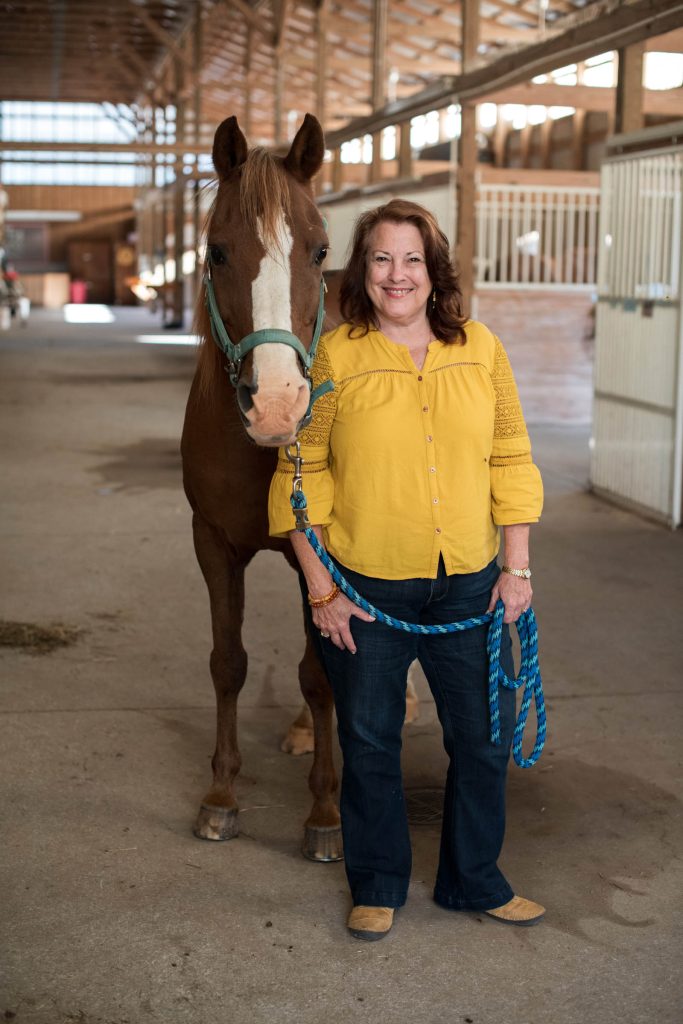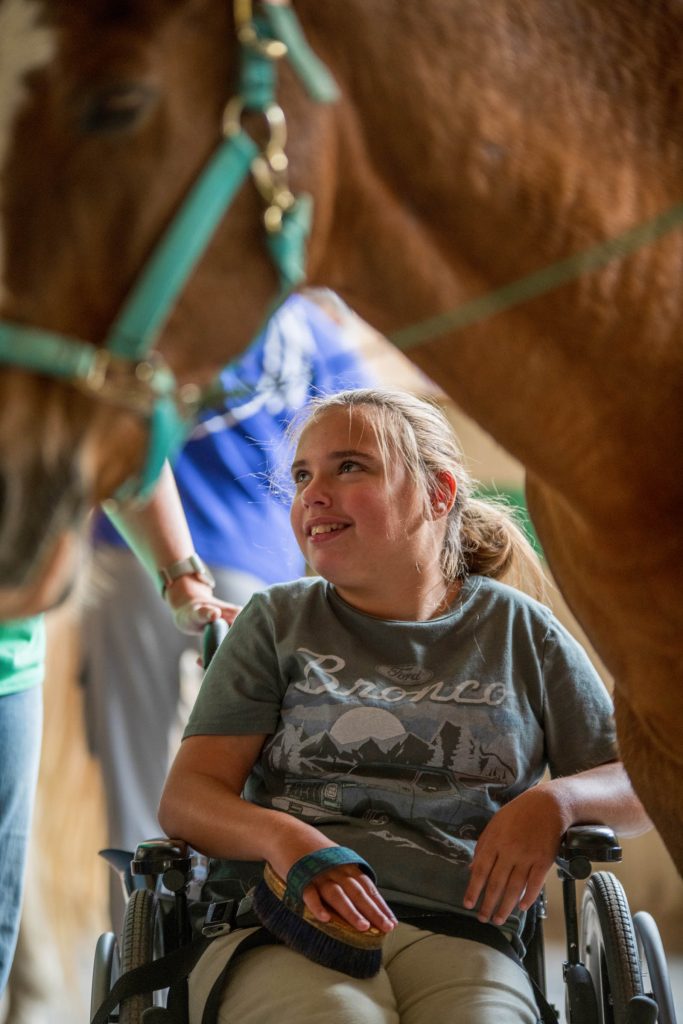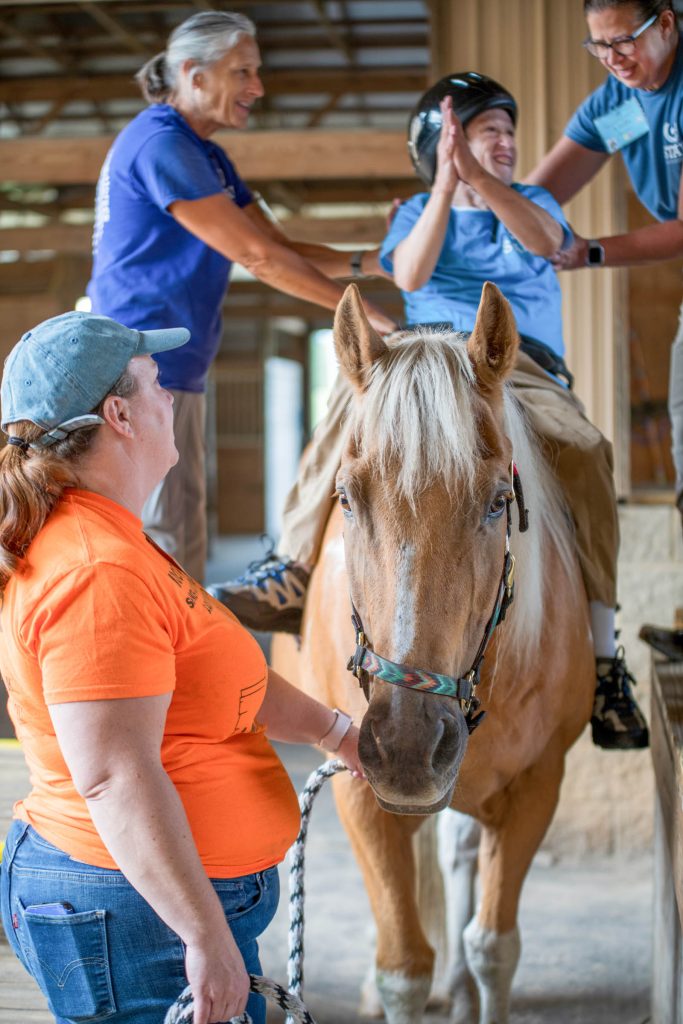Shangri-La Therapeutic Academy of Riding, or STAR, provides hundreds throughout the region with healing and hope through equine therapy
George Morgan was 16 when his parents first took him to see the horses. It was 1989, and a lifeguard at the neighborhood pool suggested his family connect with a new place in the region called the Shangri-La Therapeutic Academy of Riding (STAR), a place where children and adults alike could work with horses and reap the benefits of equine therapy.
George was nonverbal and severely handicapped, says Tom, George’s father. Tom had reservations. “George really did not interact with animals,” he recalls of that time in George’s life. He imagined George petrified of interacting with such big animals. However, after a short while at STAR, George walked right up to a horse and started petting it. He suddenly had found something he loved.
“George loves the horses, and the horses love George,” Tom says. “It just worked out beautifully. He started the program in 1989, and he’s been riding ever since.”
The Start of Something Great

STAR began just two years prior to George’s moving introduction to their program, originally as a master’s thesis project of then-UT student Lynn Petr. Lynn had been working on this curriculum and concept since the summer before her sophomore year. While working as a horse camp counselor, she would come to recognize an odd reaction from one of her most challenging campers. “She asked if she could go up and talk to her favorite horse that was standing under a tree. And I said, ‘Sure. Go ahead,’” Lynn recounts. “I just kind of hung back, and she wrapped her arms around that horse and started to cry.” Lynn let the moment play out, and as the camper stroked the horse and cried into its mane, she spilled details of all the things in her life that were causing her angst. Later, after the camper’s family came to get her and she mouthed “thank you” from the backseat of the car as they drove off, something clicked for Lynn. “What if I could marry my love of children with my love of horses?”
With a new idea in mind, Lynn would end up changing her degree to special education. After getting her diploma, she would then go on to share her idea far and wide looking for support. And while she saw her fair share of dismissals about her idea to use horses as a way to provide therapy to those who needed it, she pushed forward, ultimately ending up in Anderson County. Though initially seeing the idea as lofty, the head of a local school would give Lynn a single hour to show him what she could do. She would go on to secure a job with the school as, as she calls it, “the farm lady.”
Lynn ran programming, four students at a time, helping them with their studies, using the farm as a tool for that learning. By the second year, she had introduced physically challenged students to the program and her first year of students began to take on new roles in the program, assisting the new students as “side walkers” during their riding sessions. And while Lynn would eventually have to end the school farm program due to a gap in grant funding, she would spend years in the classroom preparing for the moment she’d one day build out her own equine program.
Therapeutic Riding
Fast-forward to 1987, after pitching her idea and curriculum to a graduate professor, Lynn began her master’s program and her thesis to start a therapeutic riding program with horses. Four years later, she graduated with her masters, got married, and incorporated STAR.
At the time, the organization served 15 people each week through its core program of Therapeutic Riding, which continues today. The program meets participants where they are in life, offering them opportunities to groom, saddle, and eventually ride the horses. Trained staff work alongside them, as do a host of volunteers, all there to ensure the program participants are safe, happy, and reaping the rewards of working with the horses.
The number of participants grew, and the organization moved locations as the needs of its participants changed. Eventually, in 2002, they found themselves at their forever home, a 63-acre farm in Lenoir City where it still is headquartered today.

Growing Programs
Alongside its flagship program today are a host of other programs, all designed to serve a very specific population of individuals. The Minis in Motion program was originally prepared for the classroom setting, as an alternate opportunity to a field trip. Lynn and her team would bring mini horses to the schools for students to learn and interact with. But a visit from a local assisted living facility helped Lynn realize there was more these minis could do.
“We had a group of people come out to the barn from a memory care unit,” Lynn says. The people loved the experience of interacting with the horses so much that the staff of the unit asked Lynn if she would consider bringing the horses to their facility. She obliged and the program grew.
“They bring the horses in and they have these little shoes and dresses and little tiaras on them,” says Tammy Price, program director at The Lantern at Morning Pointe in Lenoir City. “Just the looks on those residents’ faces when those minis walk in here is just something. You’d never imagine seeing that smile on their face again.”
The minis have been coming to The Lantern for as long as Tammy can remember—she’s been there for 13 years—but her relationship with STAR grew once more about two years ago, when a 92-year-old woman came into her unit who had worked with horses for a living. “I kept trying to think, what can I do to make her feel more at home, more easy, get her out there,” Tammy says. She called Lynn and asked if she could bring the resident to tour the barn. “From then on, we signed up for the Reflections program,” Tammy says, the program designed to bring the therapeutic nature of horses to those with Alzheimer’s and dementia. “A lot of my residents when they leave the [memory care] facility, they’re very anxious and always worried about everything, [but] when they look at those horses, all their worry just kind of leaves them for that hour that we’re there. They have not a worry in the world, a completely different attitude.”
Heroes & Horses
The programs at STAR reach far and wide, and each serves unique purposes for the individual groups they work with. That can be felt greatly in the Heroes & Horses program, designed specifically to meet the needs of veterans and active military personnel.
Jim was one of the first volunteers in the program, signing on after retiring from the entrepreneurial life in 2006 after a 27-year career in the US Air Force. “All of the veterans who have been participating in the program have some physical or mental health challenges that they’re dealing with,” Jim says. The riders go through a fundamental ground course where, like many of the programs, they are taught how to groom the horse, prepare it for a rider, and walk it. They eventually move on to a riding-based course, and the impact, Jim says, is vast. “There is a bond that develops between the horse and the rider. It’s just a natural thing.”
Corey Hendrix, who spent nine years in the US Army, entered the program during a challenging point in his life. “I had a drinking problem for a long time, and it helped me get through that and realize that there’s more to life than what I see,” he says. “It gives me something to look forward to throughout the week. And even though it’s only an hour, it’s still an hour of peace, and I live for it.”

In the five years he’s been going to STAR, he’s developed relationships with the horses. “It helps me cope with life,” he says, adding later. “The military gives you one big family. We live with each other every single day, and then when you get out of the military, it’s like you’re on your own. You have the same people every day doing the same routine, and then it’s over. And I think at STAR it kind of gives you that family orientation back. Even though I only see them one hour a week, I still feel welcome, and it’s just like that big family again.”
More to Come
Programs abound at STAR. While the Strides program originally began with a local alternative school, it has since expanded to work with adjudicated youth, as well as individuals with drug and alcohol addictions. The curriculum is also applied to the organization’s newer Stable Friends program, a result of Covid that works with teenagers who may be dealing with anxiety and stress and need assistance with learning coping mechanisms.
In 2016, the organization received a donation of a 47-acre equestrian farm in South Knoxville from two long-time supporters. Today, aside from growing their staff, training volunteers, and bringing the therapeutic nature of horses to individuals across the region, STAR continues work on its new facility, which Lynn hopes will allow them to grow in their service to others. “When we can get that done, it will enable a lot of other people to be served,” Lynn says. “We have 160 people on a waiting list and that’s just for therapeutic riding.”
To learn more about STAR and how you can get involved, visit rideatstar.org.

Comments are closed.